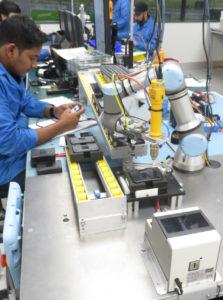Cluster theory fails to take hold in NZ manufacturing
Twenty-seven years after the Porter Project recommended New Zealand should pursue a “clusters” strategy to develop its manufacturing base, a government study of the manufacturing sector has found there are “few economically significant manufacturing clusters in New Zealand”.
Without mentioning the government’s commercialisation accelerator agency, Callaghan Innovation, by name, the Ministry of Business, Innovation and Employment’s New Zealand Manufacturing Sector Report suggests that “new institutions may need to be established, or existing institutions modified”.
Callaghan is expected to see funding cuts for direct grants to companies seeking research and development assistance in the May Budget, as the government moves to introduce a new R&D tax credits system.
Economic Development Minister David Parker launched the report, the first such overview of the sector by the Ministry of Business, Innovation and Employment since it began publishing sector reports in 2013 under the previous government, in Auckland this afternoon.
The report notes poor productivity persists in the sector and the long lead times required for new, higher value industries to emerge and appears to suggest changes are required to existing policy settings and government agencies to help deliver better results.
“The development of a new industry typically follows an ‘S’ curve, similar to the stages a new technology goes through as it diffuses through society,” the report says. “There is usually a long gestation period – perhaps 10-20 years – while the skills and capability needed to succeed are learned and acquired by: firms; investors and service providers; and the education and government sectors.
“New institutions may need to be established or existing institutions modified.”
The government is also conducting reviews and reforms of the education system, including initiatives to improve the financial stability and quality of skills training through the country’s polytechnics.
The manufacturing sector is a disproportionately large employer of tradespeople, but “firms that need very specific technical expertise can also struggle to find these skills in New Zealand’s relatively shallow and generalist labour pool”.
Visas for workers with skills relevant to manufacturing had doubled in the last five years, MBIE found, although that did not improve the sector’s poor productivity performance.
Manufacturing productivity growth of 0.2 percent a year in the decade to 2015 was well below the national average of 1 percent annually. The largest part of the sector is devoted to processing agricultural commodities into food and beverages.
The report found that workers in the manufacturing sector, which comprises 12 percent of the economy, earned on average $63,228 a year in 2016, some 15 percent above the national average.
However, they also worked longer hours than average, meaning annual hourly earnings in the year to June 2017, at $28.80, were below the average for all industries, at $29.90.
On industry clusters, which Harvard University competitiveness guru Professor Michael Porter recommended as key to improving New Zealand’s export competitiveness in a ground-breaking report in 1991, the report said they were “important for innovation and competitiveness, but New Zealand has few economically significant manufacturing clusters”.
“Even when New Zealand has an industry with high competencies and an international profile, it tends to be dispersed across different locations,” the report says. “For example, New Zealand’s marine industry is ‘centred’ in Tauranga, Auckland and Northland.”
While Auckland’s food and beverage industry had “all the hallmarks of an internationally significant cluster” and Canterbury had a long history in electronics manufacturing, “it is more realistic to think of New Zealand’s clusters as emerging or ‘micro-clusters’ when compared to international peers.”
Nonetheless, the report noted that, “encouragingly”, New Zealand’s cluster development ranking in the latest Global Competitiveness Report had jumped from 64th in 2013 to 44th in 2018.



